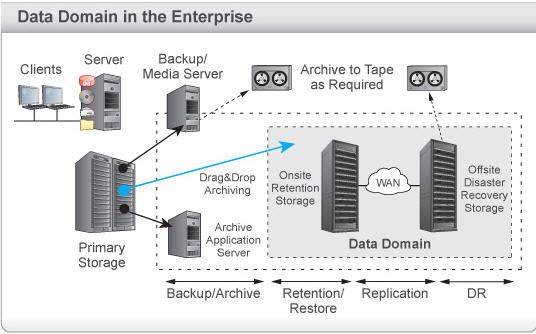NetApp buys Data Domain for $1.5 billion

NetApp said Wednesday that it will acquire Data Domain for $1.5 billion, or $25 a share.
Data Domain makes deduplication storage systems designed to cut cost and make data management easier. NetApp said in a statement that its game plan is to take Data Domain's products and work it through NetApp's global sales channel. Data Domain's products will become a line in NetApp's operations.
Ultimately Data Domain and NetApp's VTL lineup is designed to move companies off tape backups. For 2008, Data Domain had revenue of $274 million, up from $123.6 million in 2007. Net income for 2008 was $21.6 million.
Here's where Data Domain fits into the enterprise:
Needless to say, Data Domain investors were jazzed about the deal in afterhours trading. The NetApp deal propelled Data Domain to the levels where it traded for much of 2008 before the meltdown.
Separately, NetApp reported fourth quarter earnings of $75 million, or 23 cents a share, on revenue of $880 million, which was down from $938 million a year ago. Excluding charges, NetApp reported earnings of $103 million, or 31 cents a share. Wall Street had been expecting earnings of 23 cents a share.
For fiscal 2009, NetApp reported net income of $87 million, or 26 cents a share, on revenue of $3.4 billion, up 3 percent from a year ago. Non-GAAP earnings were $364 million, or $1.09 a share.
NetApp refrained from providing first quarter revenue guidance due to the economy. It did project non-GAAP gross margins of 61 percent for fiscal 2010. In a statement, NetApp chief Dan Warmenhoven said the company has kept the lid on expenses and managed to raise operating margins for three quarters in a row.
NetApp, along with EMC, appear to be among the winners amid data center overhauls. By playing nice with various giants---HP, IBM, Cisco and Dell to name a few---these independent storage vendors appear poised to tag along no matter what architecture ultimately wins.
